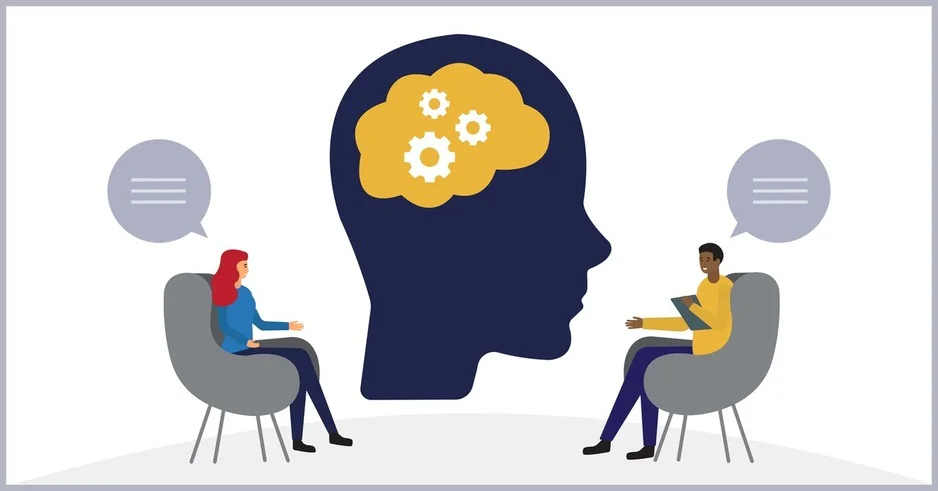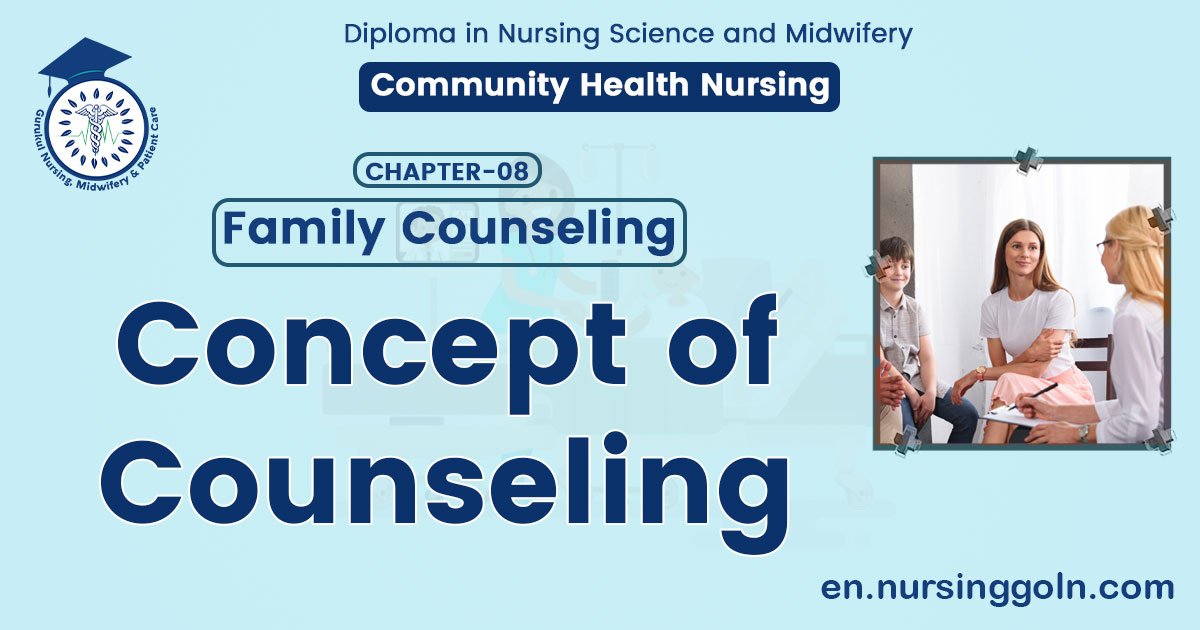Concept of Counseling- This book covers the entire syllabus of “Community Health Nursing” prescribed by the Universities of Bangladesh- for Basic and diploma nursing students. We tried to accommodate latest information and topics.
This book is examination friendly setup according to the teachers’ lectures and examination’s questions. At the end of the book previous university questions are given. We hope in touch with the book students’ knowledge will be upgraded and flourished. The unique way of presentation may make your reading of the book a pleasurable experience.
Concept of Counseling

Concept
Counseling is a communication process by which caregivers provide accurate information about. the subject where care receivers are interested to know anything. Family counseling is also one of the important components of health services.
The community health nurse will determine the family needs. Assessment is the first step of the nursing process, which for nurses means to collect and evaluate information about a community’s health status to discover existing or potential needs as a basis for planning.
Counseling
Counseling is a method when a nurse / health worker discusses, teaches and guides the client or person about any specific topic on a personal basis.
Or
Counseling is a communication process by which caregivers provide accurate information about the subject where care receivers are interested to know anything. Counseling is known as one kind of psychotherapy- Sometimes a person feels relaxed when he/she speaks out or talks to others.
Characteristics of counseling
- It involves two individual one seeking help and the other a professionally trained person who can help the first. One who seek help is counselee and the one who provide help is the counselor.
- There is a mutual respect between the two individuals.
- It is aimed to bring about desired changes in the individual for self-realization and providing assistance to solve problems.
- The counselor identifies the problems of counselee and help him to take decision, make a choice or find a direction.
- It is more than advice giving, solution emerge through thinking that the person does for himself rather than solutions suggested by the counselor.
- It involves more than offering assistance to find a solution to an immediate problem. Its function is to produce changes in the individual thereby enabling him to deal with the difficulties in a more productive and independent manners.
- It is a purposeful learning experience for the counselee.
- Counseling process is structured around the felt needs of the counselee.
- Main emphasis in the counseling process is on the counselee’s self-direction and self- acceptance.
Goals of counseling
A few important goals of counseling are as under :
a. Facilitating behavior change
b. Enhancing coping skills
c. Promoting decision making
d. Improving relationships
e. Facilitating the client’s potential
Aims and Objectives of Counseling
- To acquire knowledge and clinical skills in providing individual psychotherapy.
- To acquire knowledge and clinical skills in providing group psychotherapy.
- To develop intake and diagnostic assessment skills.
- To acquire knowledge and skills in crisis intervention.
- To (prepare professional psychology interns as practitioners who can) provide outreach and consultation.
- To develop knowledge and skills in providing clinical supervision.
Importance of counseling for students
1. To give the student information on matters important to success.
2. To get information about student which will be of help in solving his problems.
3. To establish a feeling of mutual understanding between student and teacher.
4. To help the student work out a plan for solving his difficulties.
5. To help the student know himself better-his interests, abilities, aptitudes, and opportunities.
6. To encourage and develop special abilities and right attitudes.
7. To inspire successful endeavor toward attainment.
8. To assist the student in planning for educational and vocational choices.

Process of counseling
A nurse / health worker can help the patient by following this simple procedure:
1. Listen to their difficulties/needs/problems.
2. Talk to their family.
3. Try to help them change their situation.
4. Provide pleasant environment while counseling.
Stages of counseling
1. Stage one: Relationship building.
2. Stage two: Assessment and diagnosis.
3. Stage three: Formulation of counseling goals.
4. Stage four: Intervention and problem solving.
5. Stage five: Termination and follow-up.
6. Stage six: Research and evaluation
Types of counseling
A. Individual counseling
Individual counseling is a cooperative and respectful process between therapist and client to facilitate change. Engaging in counseling during challenging times takes courage and commitment. The benefits of counseling can lead to greater self-awareness, insight and strength to face the challenges of life, to find hope and meaning.
B. Relationship counseling
Relationships are central to our psychological health. Healthy and supportive relationships with friends, family, or partners are associated with increases psychological well-being, and reduced levels of depression and stress.
C. Family counseling
Family therapy can help marriages, couples and families withstand the stress that comes along with some of life’s challenges.
D . Children and adolescent counseling
Therapists are available to help child or teenager with emotional, behavioral and social challenges.
E. Group therapy
Group therapy provides unique benefits, like multiple listeners and perspectives whilst
learning are not alone in experiences.
Other types:
- Marriage and family counseling.
- Guidance and career counseling.
- Rehabilitation counseling.
- Mental health counseling.
- Substance abuse counseling.
- Educational Counseling.
Advantages
Individual counseling
- Helps secret consultation
- Maintain privacy
- Better rapport
- Group counseling
- Saves time
- Better interaction
- Uniform information to a large group
Or
Advantages of counseling
1. Clarity on confusion
2. Right directives
3. Identification of likes and dislikes
4. Identification of area of improvement
5. Clarity of thoughts
6. Clarity of thinking pattern
7. Clarity of physical and mental absences
8. Road map for future

Disadvantages of counseling
1. Leakage of privacy (though as a counselor everyone take oath to not to disclose the privacy of a client)
2. If not counseled properly, it may lead to more negative impact
3. Initial hitch
4. Long time to cure
Benefits of family counseling
1. Developing healthy boundaries.
2. Improving communication.
3. Defining someone’s role within the family.
4. Improving family dynamics and relationships.
5. Providing strength and coping tools for family members.
6. Addressing dysfunctional interactions.
7. Improving the family’s problem-solving abilities.
Elements of counseling
- Greet clients
- Ask needs
- Tell about services methods
- Help Explain
- Return for follow-up
- Relax
- Open-up
- Lean forward
- Eye contact
- Sit squarely and smile where appropriate
- Clarify
- Listen
- Encourage
- Acknowledge
- Reflect and repeat
Principles of counseling
- Tailor made to the requirement of an individual’s problem.
- Emphasizes thinking with the individual
- Avoid dictatorial attitude
- Maintains relationship of trust and confidence with the client.
- Client’s need is to be put first
- Everyone participating in the counseling process must feel comfortable
- Skills of warmth, friendliness, openness and empathy are ingredients of successful counseling process.
- Counselor has to listen attentively, answer question objectively, and reinforce important information.
- let the client make voluntary informed decision
- Maintain dignity of individual as individual is primary concern in counseling.

Role of counselor
- Help client to solve problem
- Guide for correct decision making
- Making friendly environment building and rapport building.
- Maintain security.
- Stress benefit.
- Assure voluntary decision
- Evaluate work effectiveness
Qualities of a good counselor
a. Shows respect for clients
b. Ability to speak the client’s language
c. Trustworthiness
d. Good listener
e. Emotional maturity
f. Leadership quality
g. Unbiased and supportive attitude
h. Have patience and tolerance
i. Empathetic
j. Ability to speak the client’s language.
Family Counseling

Family counseling, is a branch of psychotherapy that works with families and couples in intimate relationships to nurture change and development.
Or
Family counseling brings together members of a family to work through situation or relationship issues. Concerns may include changes in family relationships, conflict, health issues, addiction or other. Counselors will help the family recognize their patterns, build on the positive and develop alternatives, providing all family members a voice in the process.
Or
Family counseling should be a continuous process as for as health of family is cornered. Habit is not easy to change, once it has been formed. It may take years to change, depending upon individual’s attitude & thinking. Family counseling is also one of the important components of health services.
See More:
